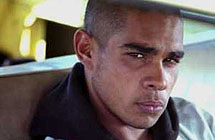|
|
|
|
Beneath
Clouds
|
 |
|
A small and perpetually anxious film industry like Australia's has a lamentable tendency to latch onto new, young talents and overpraise them at the very start of their careers. This does no one any good, least of all the filmmakers, who often step from a wildly acclaimed debut into the paralysis induced by second film syndrome – the inability to meet, let alone top, unreasonable expectations of instant genius. In Australia – and this happens nowhere else in the world that I am aware of – the over-inflation of fledgling careers can begin even before the first feature. Such lavish attention is paid to short films here, with the many events and awards devoted to the format, it can seem that Orson Welles has been reincarnated in our midst after only a couple of minutes of attention-grabbing footage have publicly unspooled. Beneath Clouds was the most overrated Australian movie of its year. I say this not to pan writer-director Ivan Sen, who clearly has striking and promising talent, but to warn against the perpetuation of dangerous kiss-and-kill tendencies in our film industry. Sen's full-blown debut (after his well-known shorts Tears [1998] and Dust [1999]) exemplifies most of the problems of first-time feature filmmaking in this country. The mastery of a large-scale narrative form eludes him; the movie feels like a short artificially stretched beyond breaking point. Lena (Dannielle Hall), discontented in a small town, leaves her Aboriginal mother and brother with the dream of reaching Sydney to see her Irish father. Along the road, she strikes up a tentative friendship with Vaughn (Damian Pitt), a troubled and angry lad on a collision course with authority. Beneath Clouds aims for understatement and suggestion, but ends up being merely slight and repetitious. The great Australian proclivity to undercut any action, spectacle or melodramatic drive drains the film of the force it might have had. It is all bones and no flesh. It is both admirable and disconcerting that Sen has so confidently stepped forth as an auteur. He not only wrote the script but also co-composed the score – unwise decisions, in my view. Sen needs to collaborate with other writers, for what his film lacks is dramatic substance. And he also needs to get beyond the temptation to forever set a mood – something he does with abundant flair. Sen's aptitude is in the realm of the pure image. I found myself, all through Beneath Clouds, remembering pictorial effects from Terrence Malick's films – characters framed like dots in a starkly empty, industrial landscape as in Badlands (1973), or moving within nature as in Days of Heaven (1978). But pure images are not enough to make a complete movie. Sen may have had the high example of Robert Bresson in mind when he decided to direct his non-professional cast in a decidedly stylised way. Hall and Pitt have a soulful screen presence, but their Bressonian mannerisms (Hall seems to avert her eyes downward after speaking at the end of all her shots) quickly become counter-productive. Beneath Clouds is a frustrating experience. I do not object, as some have, to the film's lack of an explicit political agenda – we are too quick, in the present climate, to demand that every film with Aboriginal characters be a reassuring or sledgehammer-wielding allegory of national reconciliation. Sen is right to present it as an essentially humanist tale of personal yearning. But, although he has the sort of cinematic talent one usually sorely misses in Australian movies, his artistic gift has yet to reach a point where it can either command or reject the conventions of narrative. Let us hope the local industry does not leave him high and dry after this hit-and-miss debut. MORE contemporaneous films on Australian indigenous-settler reconciliation: The Tracker, Ten Canoes, Rabbit-Proof Fence MORE Australian indigenous films: Black Chicks Talking, Whispering In Our Hearts, Nice Coloured Girls, Night Cries, Bedevil © Adrian Martin May 2002 |
![]()